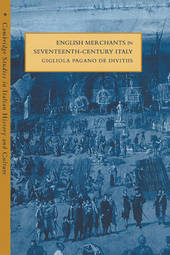
|
English Merchants in Seventeenth-Century Italy
Hardback
Main Details
Description
This book shows how England's conquest of Mediterranean trade proved to be the first step in building its future economic and commercial hegemony, and how Italy lay at the heart of that process. In the seventeenth century the Mediterranean was the largest market for the wool, spices and colonial products which were exported by English merchants, as well as being a source of raw materials (Spanish wool, Puglian oil, oriental silk) which were indispensable for the growing and increasingly aggressive domestic textile industry. Italy lay at the centre of this trade network: Venice, Genoa and Florence had been major centres of trade for centuries, and remained rich and powerful. In addition the new free port of Livorno became the linchpin of English trade with the Mediterranean as a whole and, together with ports in southern Italy, formed part of a system which gradually enabled the English merchant fleet to take over control of the region's trade from the Italians. In her extensive use of English and Italian archival sources, the author looks well beyond Braudel's influential picture of a Spanish-dominated Mediterranean world. In doing so she demonstrates some of the causes of Italy's decline and its subsequent relegation as a dominant force in world trade.
Reviews"...moderately advanced students as well as specialists in economic history will find in English Merchants in Seventeenth-Century Italy a useful compendium of data and an often though-provoking case study in that remarkable amplification of English commerical range and power which laid the basis for Britain's later global pre-eminence." Geoffrey Clark, Canadian Journal of History
|